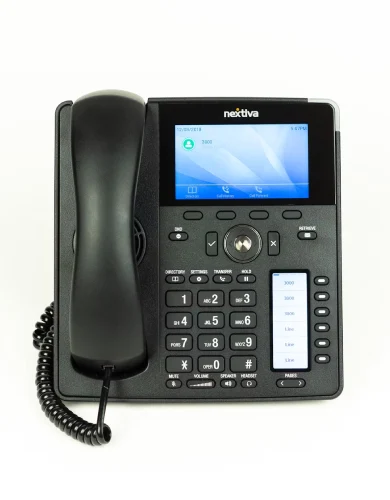What is a VoIP phone system?
VoIP (Voice over Internet Protocol) is a modern alternative to traditional business phone lines, using the internet to transmit voice calls instead of landlines or mobile networks.
It offers businesses a cost-effective, flexible, and scalable communication solution with advanced VoIP features and seamless integration with CRMs, helpdesk software, and other essential tools.
Unlike standard phone services, VoIP supports high call volumes, multi-location connectivity, and access via VoIP desk phones, headsets, and mobile or desktop apps. Cloud-based VoIP systems further enhance business operations with call routing, recording, analytics, and encryption for secure communication.
Core benefits of VoIP for business
VoIP phone systems offer greater cost-efficiency, flexibility, and scalability than traditional landline systems and provide distinct advantages over popular device-to-device VoIP platforms like WhatsApp, Google Meet, Zoom, and Teams.
Below we summarise the key benefits of VoIP communication technology:
Cost savings
VoIP significantly reduces communication costs compared to landline phone systems, especially for long-distance and international calls. This is possible because VoIP is internet-based, bypassing the costly infrastructure of traditional telephony, which keeps expenses low and predictable.
Find out more in our guide to business VoIP costs.
Flexibility
With VoIP, employees can make and receive calls from virtually any device (smartphone, tablet, laptop, or VoIP phone) using a stable WiFi or internet connection.
This enables seamless communication from anywhere. Whether on the go, working remotely, or from home, VoIP supports flexible work arrangements and maintaining productivity across locations.
It also supports multi-party calls, ideal for team and client meetings, and call routing to ensure someone always answers the phone.
Find out more in our guide to remote VoIP solutions.
Scalability
VoIP systems allow businesses to quickly add or remove lines as needed, especially on flexible VoIP plans.
Network switches let you easily add or remove VoIP phones in the office, and VoIP apps can be instantly installed or uninstalled from mobile devices.
This means businesses can expand or reduce their system according to seasonal needs, workforce growth, or project demands, which was much more challenging with traditional landlines.
Advanced features
Advanced commercial VoIP systems called UCaaS integrate seamlessly with digital applications like VoIP call analytics, AI tools, email, smart call forwarding, and video conferencing, allowing for a streamlined workflow.
For a detailed list, see our article on the latest business VoIP features.
Call quality and reliability
VoIP systems offer high-definition audio, surpassing traditional phone line clarity for professional communication.
Cloud-based VoIP hosting ensures continuous service with automatic backups and quick recovery.
How does a VoIP phone system work?
A VoIP phone system makes and receives calls by converting voice into digital data, transmitting it over the internet, and reconstructing it as sound, all within milliseconds.
Here’s how the process works:
1. Voice conversion
When a user speaks into a VoIP phone or app, their voice is captured and converted into digital packets using a VoIP protocol called Session Initiation Protocol (SIP). Each packet contains small segments of the conversation along with the necessary addressing data to ensure it reaches the correct recipient.
- If calling another VoIP system, the packets are prepared for direct internet transmission.
- If calling a landline or mobile, the system sends the call to a VoIP gateway, which converts the digital data into a format compatible with the Public Switched Telephone Network (PSTN) or mobile network.
2. Data transmission
The digital packets are sent across the internet instead of using traditional phone lines. VoIP systems rely on business broadband and Quality of Service (QoS) settings to prioritise voice traffic and protect VoIP call quality.
3. Receiving and routing
When the VoIP system receives an incoming call, it collects the data packets, reassembles them in the correct order, and converts them back into sound to the user.
- If the call is VoIP-to-VoIP, the VoIP system plays the reconstructed audio through their VoIP desk phone, mobile app, or softphone.
- If the call originates from a landline or mobile, a VoIP gateway converts the analogue signal into VoIP format before it is delivered to the user.
During this process, call routing ensures the call reaches the right recipient. VoIP systems can forward calls based on business-specific configurations, such as directing them to different locations, departments, or backup devices.
4. Integration
Once the call is connected, VoIP systems can integrate with CRMs, call recording software, and helpdesk tools, allowing businesses to track calls, automate workflows, and improve customer service.
VoIP installation process
VoIP installation is straightforward but requires careful planning to ensure optimal performance, security, and integration with your existing business tools.
To get started, businesses must assess their needs, choose a VoIP provider, and ensure a stable business broadband connection to prevent latency issues. The right business broadband router can help prioritise VoIP traffic for clear and reliable calls.
Once the system is set up, businesses must configure key advanced VoIP features such as call routing, voicemail, and security settings to meet cybersecurity compliance standards.
What businesses is VoIP for?
VoIP is essential for businesses requiring advanced call management, integration with other systems, or strong VoIP security features. Here are the main examples:
| Business | VoIP Use Overview |
|---|---|
| Call centres | VoIP efficiently manages high call volumes, routing calls to the right agents and linking with CRM systems. It enables quick, organised customer support and smooth operations. |
| Sales | Essential for frequent outbound calls, VoIP supports scalable team growth, automates call logging, and integrates with CRM systems, keeping client communication well-organised and effective. |
| Retail chains | VoIP connects all locations on one system, ensuring consistent customer service, smooth inter-store coordination, and efficient communication across branches. |
| Healthcare and telemedicine | VoIP provides secure, compliant patient communication, crucial for telehealth. Encrypted calls and recordings ensure patient privacy and continuity in remote care. |
| Legal and financial firms | VoIP ensures secure, private client communication with encryption and secure logging, meeting compliance needs. Integration with client management and cybersecurity software further safeguards interactions. |
| Logistics and transportation | VoIP links dispatchers, drivers, and warehouses for real-time coordination across the supply chain. Integrating with supply chain management software, VoIP supports responsive and efficient logistics. |
| Education providers with remote learning | VoIP enables reliable, time-zone-friendly communication for online education, connecting students, parents, and teachers. It supports high call volumes and maintains consistency in remote learning environments. |
How to acquire a VoIP system
If you’ve decided to install a VoIP system for your business, here’s what you need to do:
- Assess needs: How many VoIP phones do you need? Do you need the advanced features of UCaaS? Is your business broadband speed and latency performance sufficient?
- Choose a provider: Research and compare reputable business VoIP providers. Some give free trials!
- Budget: Confirm all costs, including setup, equipment, and monthly fees, and assess the expected ROI.
- Get equipment: Choose VoIP phones, headsets, and a load balancing router that integrates smoothly with your CRM or project management software.
- Implementation: Depending on the setup complexity, your provider will install and test the system. They should also offer training for your team.
- Security & Compliance: Ensure your system meets all cybersecurity essentials. Critical sectors like finance and healthcare must meet stringent cybersecurity compliance.
This streamlined setup will help you choose and implement VoIP to support efficient communication for your business.
Business VoIP system requirements
Several network and broadband factors must be considered to ensure smooth, high-quality performance of a business VoIP phone system. Below is a guide to the essential requirements for broadband and other network elements to support reliable VoIP communication.
Broadband requirements
VoIP requires the reliability of tethered broadband connections for clear, uninterrupted voice calls. Below are recommended performance levels based on the number of VoIP devices (i.e. users) at a single premises with their recommended broadband connection:
| Setup size | Performance requirements | Suitable broadband | Unsuitable broadband |
|---|---|---|---|
| Small office (1–5 devices) | 5–10 Mbps bandwidth, < 150 ms latency, < 30 ms jitter, < 1% packet loss | Standard fibre optic business broadband SoGEA | ADSL 5G Business Broadband Satellite business internet |
| Medium office (5–20 devices) | 20–50 Mbps bandwidth, < 100 ms latency, < 20 ms jitter, < 1% packet loss | Virgin Media Cable Full fibre business broadband Leased Lines | ADSL SoGEA 4G/5G Broadband Satellite |
| Large office (20+ devices) | 100 Mbps+ bandwidth, < 50 ms latency, < 10 ms jitter, < 1% packet loss | Full fibre Leased Lines | All the rest* |
Network requirements
Your local and wide area network infrastructure also needs to meet certain minimum criteria:
- Routers: Use a VoIP-compatible router that supports Quality of Service (QoS) to prioritise voice traffic and minimise interference from other network activities. Note: Business broadband providers don’t offer these in their standard deals.
- Ethernet vs. WiFi: For the best VoIP quality, use wired Ethernet connections, as they provide stable bandwidth and lower interference. If you use WiFi for VoIP, ensure a high-performance WiFi router (with WiFi 5 and 6 compatibility) and comprehensive coverage with mesh networks.
- Network Switches: Managed network switches help control and prioritise data traffic, improving call quality and reliability, especially in environments with multiple VoIP users.
- Broadband Redundancy: For businesses relying on VoIP for critical services (e.g., finance, healthcare), consider a secondary connection or leased line failover option to maintain service continuity during primary connection outages.
- Multi-premise VoIP: For multi-location VoIP implementations, SD-WAN solutions and SASE enhance VoIP by dynamically routing calls over the best available connection, ensuring consistent call quality across sites and reducing reliance on costly dedicated lines.
VoIP Phone System FAQs
Our business broadband experts answer frequently asked questions regarding VoIP systems for UK businesses:
How reliable is a VoIP phone system?
VoIP systems are reliable when backed by a stable, tethered fibre optic internet connection. VoIP can maintain high-quality, uninterrupted calls by ensuring good internet service and prioritising call traffic.
Also, VoIP systems are installed over business broadband connections, which don’t suffer from bandwidth throttling during peak hours (unlike residential broadband).
For more information visit our guide to managing VoIP in high traffic.
Can I keep my current phone number when switching to VoIP?
Yes, most VoIP providers allow you to port your existing number to the new system, ensuring customer continuity and eliminating the need to update contact information.
This seamless porting is part of a UK-wide transition into fully digital communications, also known as the PSTN Switch Off. You can also invest in a virtual business phone number.
How secure are VoIP phone systems?
Top VoIP providers prioritise security, offering encryption and robust security features to protect against cybersecurity threats. Choosing a reputable provider is essential for ensuring secure communications.
How does VoIP work for a small business?
VoIP converts voice into digital data and transmits it over the internet, allowing small businesses to make calls from any device, integrate with business tools, and scale their communication system affordably.
Find out more in our guide to small business VoIP solutions.

